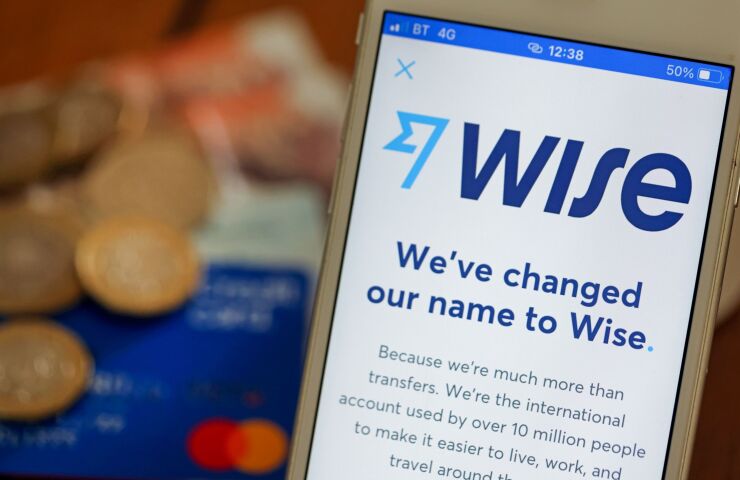The fintech company Wise rose in its debut following a direct listing on the London Stock Exchange, in the largest such deal ever, bolstering Brexit Britain’s capital-market hopes.
The money-transfer company born as TransferWise opened at 800 pence, giving it a market capitalization just shy of 8 billion pounds ($11 billion). That’s more than double the $5 billion valuation in a July 2020
The company eschewed a traditional initial public offering, opting not to raise fresh funds. Instead, shareholders were offloading a stake of at least 2.4% directly into the open market.

“The successful direct listing of Wise is clearly a boost to London’s ambitions as a global hub for tech companies,” said Liberum Capital strategist Joachim Klement. “Wise is a highly profitable and fast-growing challenger to traditional banks, that is what counts for investors,” he said.
Wise’s first-day pop brought some relief to London, where high-profile new stocks such as the food-delivery startup Deliveroo and the semiconductor technology firm Alphawave IP Group have had disappointing trading debuts this year. Wise’s listing also rode the tailwind of a rally in tech stocks.
Unlike the traditional initial public offerings for Deliveroo and Alphawave, where banks set a price based on investor feedback during roadshows, Wise’s valuation was determined by demand during an hourslong opening auction.
While Deliveroo was felled by its lofty valuation, investors also balked at the company’s unequal voting rights. More common in the U.S. and used by the likes of Google parent Alphabet and Facebook, dual-class shares are controversial in the U.K. They are seen as putting new shareholders at a disadvantage, with a select group of backers retaining tight control over the business even after going public.
Wise’s sale will lead to “greater acceptance of enhanced voting rights among more and more investors, particularly growth investors,” said Gavin Launder, a fund manager at Legal & General Investment Management. Still, the “limited amount of stock available in the listing means it could be squeezed a bit too high to start with,” he said.
Wise’s listing price is “richer” than expected, especially in comparison to its profitability, and indicates a shift in European stocks toward “more U.S.-type valuations,” said Colin McLean, chief investment officer at SVM Asset Management.
Wise’s revenue grew nearly 40% to 421 million pounds in its latest financial year. Profit before tax for the year more than doubled to 41 million pounds, it said.
Structure
Wise’s listing follows the British government’s plans to allow dual-class share ownership on the top tier of the LSE, where they are currently prohibited. The proposed change is part of a wider effort to
Chancellor of the Exchequer Rishi Sunak last week promised to make London “the world’s most advanced and exciting financial services hub.”
Wise, which counts the billionaire Peter Thiel, Silicon Valley’s Andreessen Horowitz and U.K.-based Baillie Gifford among its early investors, considered listing in the U.S., “but London was the choice,” Chief Financial Officer Matt Briers said in a June interview. “London is a great place to access global capital, and it’s also a great place to do a direct listing, a little-known secret that we are about to blow up.”
Wise was started in 2011 when the Estonian-born co-founders Taavet Hinrikus and Kaarmann grew frustrated with the high fees charged by banks on money sent from London back to their homeland. The firm now has more than 10 million customers.
It’s “a watershed moment for London,” said Alasdair Haynes, chief executive of Aquis Exchange, a share-trading platform. “While one deal alone doesn’t a city make, innovative deals of the kind will help establish the U.K. as a global hub that can compete with the U.S.”
Direct listings
Wise’s successful debut aside, bankers aren’t anticipating a rush of direct listings in the U.K., saying this route to public markets will be limited to a select few well-funded companies with wide investor bases.
Spearheaded by the likes of streaming service Spotify Technology SA in New York, they are popular among founders of tech startups, and typically used to sidestep hefty underwriting fees and hit-or-miss pricing in traditional IPOs.
But recent stumbles in the U.S., including by the cryptocurrency exchange Coinbase Global, are
While there were no underwriters, Wise retained banks to advise on the listing process, including Goldman Sachs Group, Morgan Stanley, Barclays, as well as co-adviser Citigroup.
“The success of Wise’s debut will be a good litmus test to gauge the appetite for direct listings here in the U.K.,” said Manish Madhvani, managing partner of GP Bullhound, a tech investment firm.





